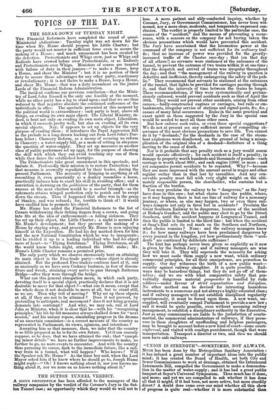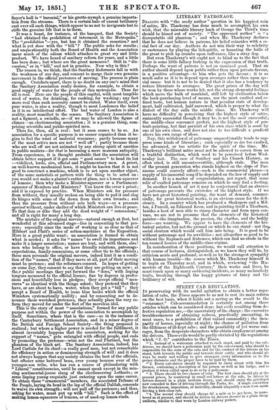"UNION IS STRENGTH"—SOMETIMES, NOT ALWAYS- Alum has been done by
the Metropolitan Sanitary Association : it has infused a. great number of important ideas into the public mind; it has created the Board of Health, set both City and Sewer Commissioners to work at drainage, obtained the Intramural Interments Bill, compelled the Government to make a demonstra- tion in the matter of water-supply ; and it has had a great public banquet at Soyer's Universal Symposium. Thus much has it done, and more; and yet we are compelled to ask whether it has done all that it might, if it had been, not more active, but more sturdily direct ? A doubt does come over our mind whether all this show of progress is quite real—whether it is more substantial than Soyer's hall is " baronial," or his grotto-nymph a genuine importa- tion from the streams. There is a certain halo of unreal brilliancy, cast over all such things, which appear to us not to invigorate but to stifle the genuine life that is in them. It was a boast, for instance, at the banquet, that the Society " had obtained the prohibition of interment in the Metropolis." The "prohibition"—yes but has it obtained the cessation? and what is yet done with "—yes, " bill"? The public asks for results ; and unquestionably both the Board of Health and the Association incur much of the odium which attaches to great cry and little product. We have heard of sanitary reform for years, and a little has been done ; but where are the great measures ? Still in "dis- cussion," or in "bill," and not in practice. Now why is this ? The reason is, we think, that the Sanitary Reformers fall in with the weakness of our day, and consent to merge their own genuine movement in the official pretences of moving. The process is plain enough. Crotchets apart, there is no doubt on any one's mind that the Sanitary Association really desires, for example, to obtain a good supply of water for the people of this metropolis. Thus far all is real. Here are the people of this capital, with most tangible need of water, for drinking, for cooking, for washing ; any fact more real than such necessity cannot be stated. Water itself, even pure water, is also a reality, though to most Londoners the belief in it is an intellectual effort. The bad water of London is also a reality, most manifest to the senses. The Sanitary, Association is not a figment, a swindle, or—if we may be allowed the figure of climax—an electioneering association ; it is a genuine thing, com- prising scientific and public-spirited men. Thus far, then, all is real : but it soon ceases to be so. An association for a specific purpose is no sooner organized than it be- gins to feel the want of material resources ; partly because many of the most active men are not " well off" ' • partly because those who are well off are not animated by any strong spirit of sacrifice in public matters—for that is becoming a mere museum antiquity. From experience, it is thought probable that the association will obtain better support if it get some " good names" to head its list —videlicet, lords, sirs, official and Parliamentary men. A priori, on well-known mechanical laws, it might be known that it is not good to construct a machine, which is to act upon another object, of the same materials or pattern with the thing to be acted on : you would not make a glazier's cutter of glass, nor a lemon-squeezer of lemons ; then why make a Minister-squeezer or a Parliament- squeezer of Members and Ministers ? You know the error a priori ; and it is exposed by practice. When Ministers ask for pressure from without, they usually reckon on being able to pad it and clog its hinges with some of the down from their own breasts ; and thus the pressure from without acts both ways—as a pressure against without, under shelter of which Ministers can live at peace. To that dam or dike they add the dead weight of " concessions," and all is right for many a long day.
The mistake of the original movers—natural enough at first, but wonderful at this advanced stage—lies in consenting to that pro- cess; especially since the mode of working is as clear as that of Hibbert and Platt's series of cotton-machines at the Exposition. Here is a great public want; an association is formed to obtain what is needed ; it asks for " names " to swell its importance and make it a larger association; names are lent, and with them, alas ! men who belong to office, or have friendly relations, patronage- expectations, family-connexions, or some other tie to the officials ; these men persuade the original movers, indeed hint it as a condi- tion of the " names," that if they move at all, part of their moving must be pretence; and the reformers consent. In hopes of getting on some day, they consent to say that they are getting on now; at their public meetings they put forward the "dons," with lisping tongues measured to the official licence, fine by degrees in profes- sions and beautifully less in pledges ; they accept official mea- mires " as identical with the things asked ; they pretend that they have, or are about to have, water, when they get a " bill " ; they accept a Board of Health, to issue blue books which the official Ministers systematically nullify ; and by consenting not to de- nounce these wretched pretences, they actually place the very re- form they moved for under the feet of moveless idoL
This is the story of most " associations," formed for any public purpose not within, the power of the association to accomplish by itself. Sometimes, where that is the case—as in the instance of the Canterbury Settlement Association, and in a minor degree of the British and Foreign School Society—the thing proposed is realized ; but where a higher power is needed for the fulfilment, it almost invariably happens that the association, seeking for the support of "names," gets entangled with official people, and ends by promoting the pretence—wins not the real Florimel, but the phantom of the black art. The Sanitary Association, indeed, has Lord Carlisle for its chief—a really good man, but not remarkable for efficiency in action or domineering strength of will : and it does riot always happen that any society obtains the best of the officials, but oftener some battered beau, ever young because ever of the younger-son tribe, who has run a course of philandering with "Liberal" constituencies, until he cannot speak except in the min- cing sentimental-jocose ;king of the electioneering Lothario ; or some lisping young exquisite ,just entering upon the same career. To obtain these " ornamental' members, the associated Tribune of the People, laying its head in the lap of the official Dalilah, consents to -waive its own strength ; will not pull off the pretence ; and thus,
asking for water, must put up with " Such is the effect of making lemon-squeezers of lemons, or of used-up lemon-rinds.



























 Previous page
Previous page